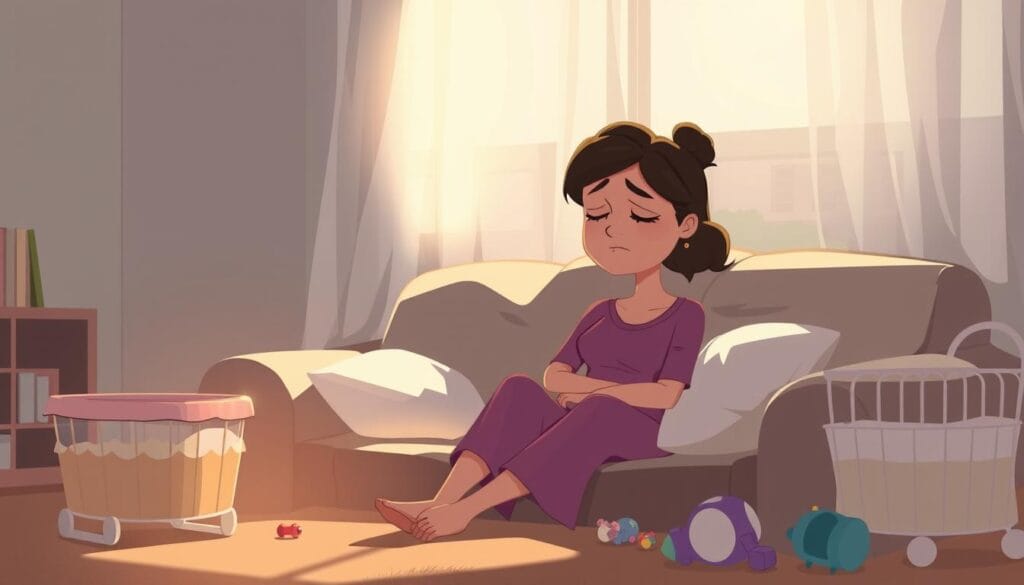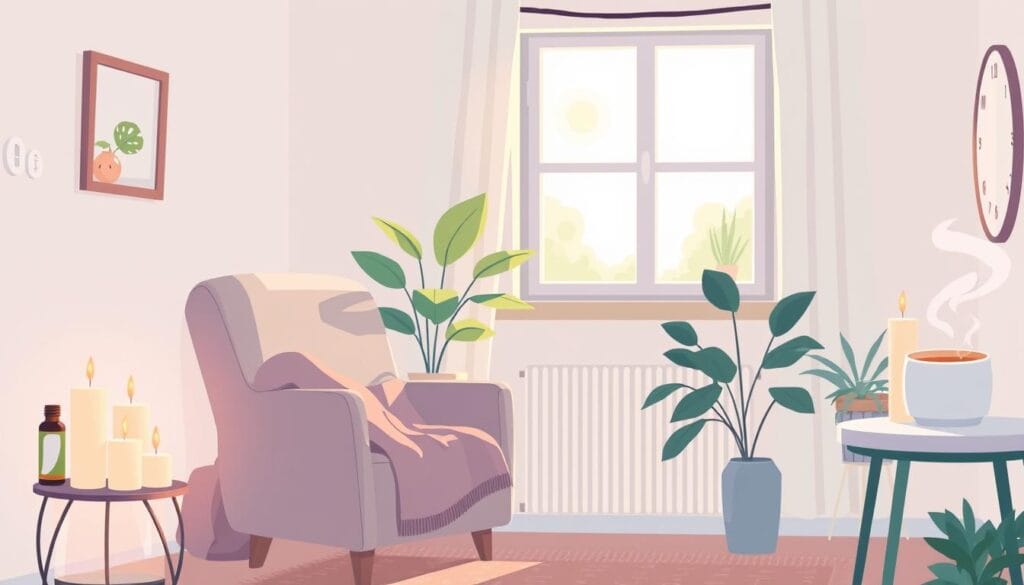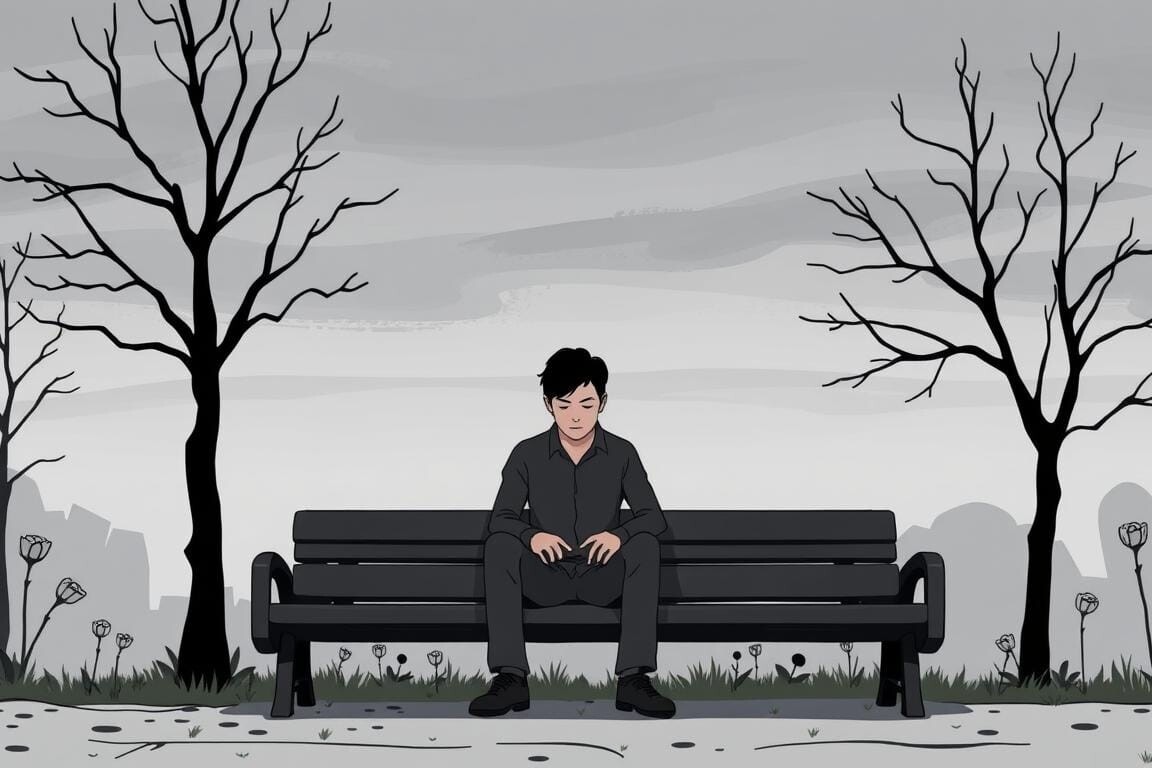Postpartum depression affects up to 15% of new moms. It brings sadness, anxiety, and tiredness. These feelings make it hard for a mom to take care of herself and her baby.
Dr. Chandril Chugh is an expert in women’s mental health. He shares relaxation techniques to help moms feel better. These methods can help moms find joy again after having a baby.
Table of Contents
ToggleUnderstanding Postpartum Depression
Postpartum depression is a serious mental health issue that can happen after having a baby. It’s key for new moms to know the signs and risks of this condition.
Symptoms and Signs
Signs of postpartum depression include feeling sad all the time, being anxious or irritable, and changes in sleep and eating. It can also make it hard to bond with the baby. Some people might even think about harming themselves.
The “baby blues” are common and usually go away in a few weeks. But postpartum depression is more serious and lasts longer. It can really affect a new mom’s daily life.
Risk Factors
Some things can make a mom more likely to get postpartum depression. These include having depression before, big hormonal changes, not having enough support, and feeling very stressed. Women who had it before are more likely to get it again.
Also, having trouble with breastfeeding can lead to postpartum depression. It’s crucial for new moms to get help if they’re feeling this way. Getting help early can really help them get better.

The Importance of Self-Care for New Mothers
Being a new mom can be overwhelming. It’s key to focus on your own care. This way, you can handle the tough parts of motherhood better.
Research shows many women don’t take care of themselves after having a baby. Less than 20% of women get back to normal activities at six weeks. This shows how vital self-care is every day.
Self-care is simple. It means getting enough sleep, eating well, and relaxing. Studies say it can lower stress by 25% and boost mental health by 40%.
Your health is as important as your baby’s. Self-care helps you manage motherhood and keep your mental health strong. Ask for help and seek professional help if needed.

Motherhood is tough, but with self-care, you can do great. Cherish small moments of self-care. Remember, caring for yourself is essential for your and your family’s well-being.
Relaxation Techniques for Postpartum Depression
Being a new mom can be tough, especially with postpartum depression. But, using relaxation techniques can really help. Deep breathing and mindfulness meditation are great options.
Deep Breathing Exercises
Deep breathing can calm your mind and body. Find a quiet spot and get comfy. Take slow, deep breaths in through your nose and out through your mouth.
Feel your belly rise as you breathe in. Let it fall as you breathe out. Do this for a few minutes to relax.
Mindfulness and Meditation
Mindfulness meditation is also very helpful. It helps you stay in the moment and feel calm. Spend 5-10 minutes each day sitting quietly.
Focus on your breath and let go of worries. It’s a simple way to find peace.
But remember, these techniques aren’t a replacement for professional help. If you’re really struggling, talk to a mental health expert. They can help you find your way back to wellness.

Postpartum Depression Relaxation Techniques
Being a new mom can be tough, especially with postpartum depression. But, there are ways to feel better. Deep breathing and mindfulness are good starts. You can also try other relaxation methods to help your mind and body.
Progressive muscle relaxation is a great technique. It involves tensing and relaxing your muscles. This can help you feel less tense and more calm. Guided imagery, where you imagine peaceful scenes, is also helpful for stress and anxiety.
- Gentle yoga or stretching can help you relax. Try different poses that feel good for you.
- Music therapy is also good for your mood. Soothing music can make you feel better, sleep better, and be less anxious.
- Writing about your feelings can be very helpful. It lets you process your emotions and find relief.
Try different relaxation techniques to see what works for you. Adding these to your daily routine can help you feel better. It can make managing stress and improving your mood easier during the postpartum time.

The Role of Support Systems
Dealing with postpartum depression can feel very lonely. But, it’s key to remember you’re not alone. Reaching out for support is a big step in getting better.
Looking for professional help is important. A therapist, counselor, or your doctor can offer the right treatment. They can teach you ways to handle your feelings.
Seeking Professional Help
A mental health expert can guide you through tough times. They might suggest therapy like CBT or interpersonal therapy. These methods can really help.
They can also check if you need medicine. This can help make your symptoms better.
Family and Friends’ Support
Having a strong support network is crucial. Family and friends can help with everyday tasks. This can reduce stress.
They can also be there to listen and offer comfort. Don’t hesitate to ask for help when you need it.
Remember, you don’t have to face postpartum depression by yourself. Professional help and your support system are key. With the right support, you can beat this and find happiness again.
Lifestyle Changes for Better Mental Health
Making lifestyle changes can really help with postpartum depression. Eating a healthy diet and staying active are key. Also, getting enough rest and sleep is very important.
Healthy Diet and Exercise
Eating well is very important for new moms. Foods like fish are good for your mood. Drinking lots of water is also good.
Walking with your baby for 20-30 minutes a day can make you feel better. It helps with postpartum depression.
Prioritizing Rest and Sleep
Getting enough sleep is crucial. Not sleeping well can make you feel worse. So, make sleep a priority.
Try to sleep at the same time every night. Make your bedroom a cozy place for sleep. This helps your body and mind rest well.
Changing your lifestyle takes time and work. But, it’s worth it for your mental health. By eating well, staying active, and sleeping well, you’re on the right path.
Overcoming Stigma and Seeking Help
Postpartum depression affects up to 20% of new moms worldwide. But, many women hide their struggles because of shame. It’s time to talk openly and support new moms.
Postpartum depression is not a sign of weakness. It’s a treatable condition that needs kindness and support. By talking about mental health, we help women feel brave enough to ask for help. Seeking help for postpartum depression shows strength, not weakness.
Ending the postpartum depression stigma starts with learning and sharing. Postpartum mood disorders can hit anyone, no matter their background. When we talk openly, more women will feel safe to seek help and share their stories.
You’re not alone in this fight. Talk to your doctor, join a support group, or share with loved ones. With the right support and resources, you can face postpartum depression and find your way back to happiness. Let’s make talking about postpartum mental health common, not rare.
Postpartum Depression and Breastfeeding
Breastfeeding is key for a new mom’s mental health. Studies show it lowers the risk of postpartum depression. But, it can also bring its own challenges that might make mental health issues worse. It’s vital for new moms to find help and advice to manage these issues.
Benefits of Breastfeeding
There’s a strong link between breastfeeding and postnatal depression. A study in Psychological Medicine found breastfeeding can help lower postpartum depression. The Journal of Psychosomatic Research also looked into how breastfeeding helps with mental health after birth.
Managing Breastfeeding Challenges
Breastfeeding has its benefits, but it can also be tough. Research shows it might be harder for moms with depression to breastfeed. To face these challenges, moms should get help from doctors, support groups, and other moms who’ve been through it.
By understanding both the good and the hard parts of breastfeeding, moms can get the help they need. With the right support, breastfeeding can be a big help for mental health after having a baby.
Conclusion
Postpartum depression is treatable and affects many new moms. With the right support and strategies, you can find relief and joy again. Try relaxation techniques like deep breathing and mindfulness. Also, prioritize self-care and seek help from professionals and loved ones.
You’re not alone in this journey. There are many resources and strategies to help with postpartum depression and anxiety. By focusing on your mental health, you can overcome challenges and thrive as a new mom. With patience, self-compassion, and a willingness to ask for help, you can look forward to a brighter future.
Your mental health after having a baby is just as important as your physical health. Use the support systems around you and try relaxation techniques that work for you. Research shows that relaxation methods can help reduce stress, anxiety, and depression in pregnant women. With the right tools and support, you can make it through this time with strength and resilience.
FAQ
What is postpartum depression?
Postpartum depression is a serious mental health issue. It affects up to 15% of new moms. It makes them feel sad, anxious, and tired, making it hard to care for themselves and their baby.
What are the symptoms of postpartum depression?
Symptoms include feeling sad and anxious all the time. You might also feel irritable, have trouble sleeping or eating, and not bond with your baby. Some people even think about harming themselves.
What are the risk factors for postpartum depression?
If you’ve had depression before, you’re at higher risk. Hormonal changes, lack of support, and stress also play a part.
Why is self-care important for new mothers?
Taking care of a new baby is tough. New moms need to take care of themselves too. This means getting enough sleep, eating well, and doing things that relax them.
What are some effective relaxation techniques for postpartum depression?
Good techniques include deep breathing and meditation. You can also try progressive muscle relaxation, guided imagery, and gentle yoga.
How can support systems help with postpartum depression?
Talking to a therapist or counselor can help. They offer proven ways to cope. Having a strong support network of family and friends also helps a lot.
How can lifestyle changes help manage postpartum depression?
Eating well, staying active, and getting enough sleep are key. These habits can improve your mood and help with depression.
How can breastfeeding affect postpartum depression?
Breastfeeding might lower the risk of depression. But, it can also add stress. This might make mental health issues worse.
Source Links
About The Author

Medically reviewed by Dr. Chandril Chugh, MD, DM (Neurology)
Dr. Chandril Chugh is a U.S.-trained, board-certified neurologist with expertise in diagnosing and managing neurological disorders, including migraines, epilepsy, Parkinson’s disease, and movement disorders. His clinical focus includes evidence-based neurological care and patient education.
All content is reviewed for medical accuracy and aligned with current neurological guidelines.




